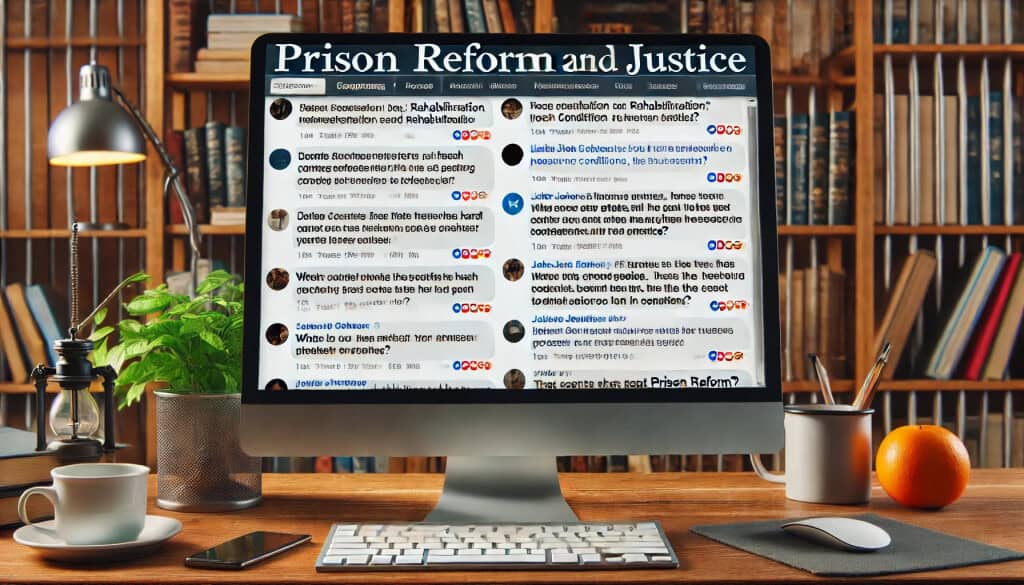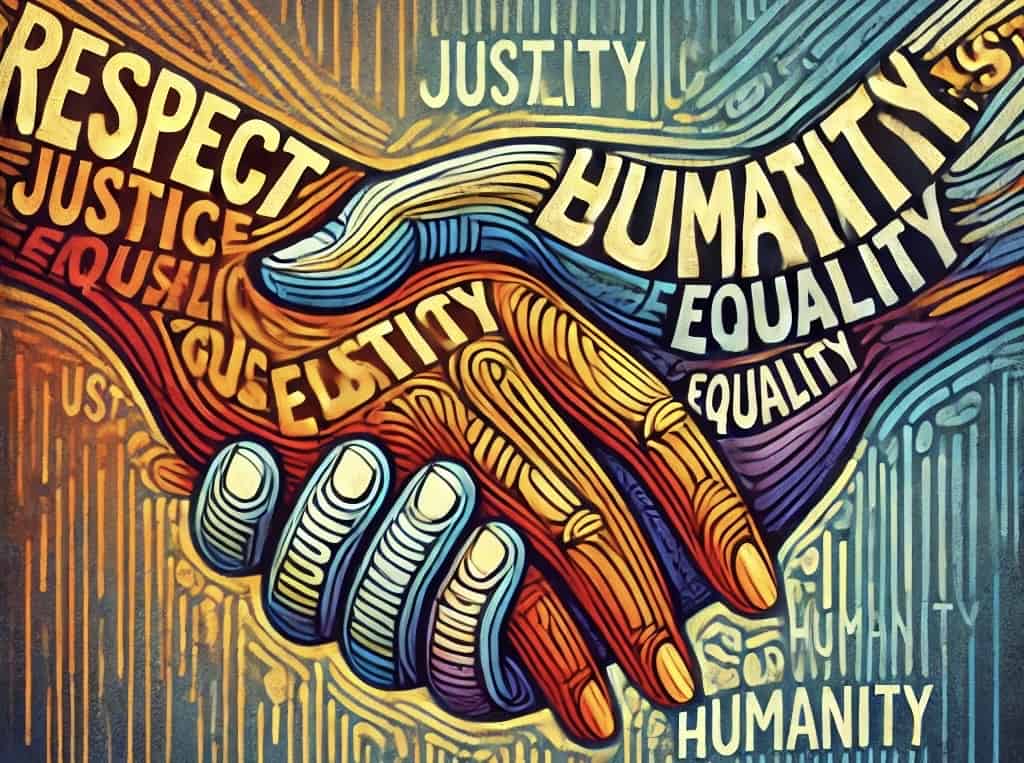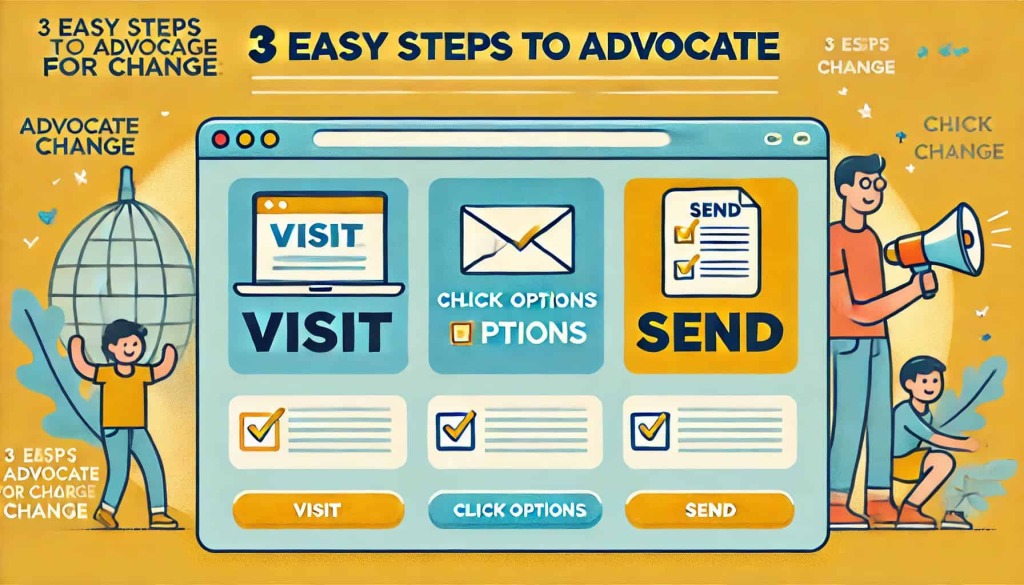
Introduction:
In discussions about prison reform, one sentiment often dominates: prisoners should suffer for their crimes. Comments on social media are flooded with calls for harsher conditions, chain gangs, and punishment over rehabilitation. “Don’t do the crime if you can’t do the time,” they say. But beneath this rhetoric lies a deeper problem—one rooted in fear, anger, and a misunderstanding of what justice truly means.
This mindset doesn’t just fail to address the complexities of crime and punishment; it actively makes our communities less safe. In Georgia, where the prison system has been described as one of the most corrupt and violent in the country, the desire for vengeance over justice has created a cycle of abuse, neglect, and failure. The U.S. Department of Justice’s scathing report on Georgia’s prisons revealed inhumane conditions, such as rampant gang violence, lack of medical care, and overcrowding, that don’t deter crime or rehabilitate individuals—they make people worse, and they make society more dangerous.
If our goal is safety and fairness, we must rethink what justice looks like. Harsh conditions and endless suffering don’t solve the problem. Instead, they perpetuate a broken system that fails victims, taxpayers, and those incarcerated alike. This isn’t just about prisoners—it’s about the kind of society we want to live in. Let’s explore the truth behind the myths, and why a justice system rooted in rehabilitation, not revenge, is the only path forward.
For many, these debates may seem abstract, but they are painfully real for people like Mario Navarrete, a decorated veteran serving a life sentence, or the mother of a five-year nonviolent prisoner who prays her son survives Georgia’s violent prison system. These stories reveal the humanity behind the statistics.
These personal stories paint a stark contrast to the common perception of prison life as comfortable or lenient. The narrative that prisoners enjoy “three meals a day, a warm bed, and free healthcare” is not only misleading—it’s harmful. It diminishes the suffering of those incarcerated and obscures the systemic failures that plague Georgia’s prison system. Let’s dispel this myth by examining the reality.
The Myth of “Holiday Inn” Prisons

There’s a persistent narrative that prisons are comfortable retreats, where inmates enjoy “three meals a day, a warm bed, and free healthcare.” This couldn’t be further from the truth. Georgia’s prison system, in particular, has been exposed for its inhumane and dangerous conditions, as documented in the recent Department of Justice report.
Families of inmates share harrowing accounts that shatter this myth. One mother described her son’s experience after being sentenced to five years for a nonviolent crime. She recounted the violence, extortion, and lack of basic safety he faced daily:
“It’s not about paying for what he did anymore—it’s about surviving. He’s watched people beaten to death, gang members torturing other inmates, pulling out fingernails, and extorting anyone who looks vulnerable. I just pray he makes it out alive.”
These stories aren’t anomalies—they’re the norm in Georgia’s prison system. Far from being “comfortable,” prisons are rife with violence, inadequate medical care, freezing temperatures in the winter, and unbearable heat in the summer. Mold grows unchecked on walls, food is often unfit for consumption, and medical care is a distant promise, if it arrives at all. These are not conditions that rehabilitate; they are conditions that destroy.
The idea of prisons as “comfortable” not only diminishes the suffering of inmates but also glosses over the systemic failures of the Georgia Department of Corrections. The DOJ report reveals that Georgia’s prisons aren’t fulfilling their intended purpose of rehabilitation. Instead, they are environments where basic human rights are violated, creating individuals who are more broken and less prepared to reintegrate into society.
If prisons are supposed to deter crime and create safer communities, Georgia’s system is failing on all counts. These facilities don’t just fail those incarcerated; they fail the taxpayers and the communities they’re meant to protect.
These harrowing realities beg the question: If prisons are this broken, why do so many advocate for harsher treatment? The answer lies in a deeply ingrained “tough on crime” mindset that values suffering over solutions. This belief, though deeply rooted, doesn’t hold up to scrutiny. Instead, it perpetuates the failures of a system that prioritizes vengeance over rehabilitation, harming society as a whole.
The Cost of Vengeance: Why “Tough on Crime” Fails Everyone

Harsh prison conditions might satisfy a thirst for punishment, but they fail as a practical tool for justice. Calls for “tough on crime” policies, like forcing prisoners into hard labor or housing them in inhumane conditions, are often rooted in the belief that suffering is the best way to enforce accountability. However, the data tells a different story: neglect, abuse, and deprivation don’t reduce crime—they perpetuate it.
In Georgia, where incarceration rates are among the highest in the nation, the outcomes of this mindset are clear. Overcrowded facilities, rampant gang violence, and systemic corruption create environments that leave individuals more damaged and less prepared for reintegration. Without access to education, job training, or mental health treatment, prisoners are released into society without the tools needed to succeed. The result? Alarmingly high recidivism rates, as people return to the same cycle of crime and incarceration.
This isn’t just a failure of compassion—it’s a failure of public safety. Every dollar spent perpetuating these conditions is a dollar not invested in the solutions proven to reduce crime. Community programs, mental health services, and educational opportunities are consistently underfunded, while billions are funneled into a system that prioritizes punishment over progress.
And yet, the human cost is matched only by the financial burden on taxpayers. Georgia spends $1.5 billion annually on its corrections system, much of which is wasted on ineffective policies that don’t make communities safer. Instead of breaking the cycle of crime, harsh conditions ensure that 95% of prisoners—who will eventually return to society—come back angrier, more traumatized, and less capable of leading productive lives.
Reform isn’t about being “soft on crime.” It’s about creating a system that works. By prioritizing rehabilitation and addressing the root causes of crime, we can build a justice system that truly delivers safety and accountability. The question we must ask is this: what purpose does vengeance serve if it fails to protect our communities, wastes taxpayer dollars, and undermines the principles of justice?
Human Dignity: A Measure of Our Society

Justice isn’t just about enforcing laws—it’s about reflecting our values. The way we treat those incarcerated speaks volumes about who we are as a society. Stripping people of dignity, denying them basic rights like healthcare or adequate shelter, and perpetuating cycles of cruelty doesn’t make us safer—it erodes the moral fabric of our communities.
Georgia’s prison system is a stark reminder of what happens when dignity is stripped away. In a system where violence and neglect are the norm, people leave prison more broken than when they entered. They return to society traumatized, unstable, and often more likely to reoffend. This isn’t just a moral failing—it’s a practical one. Treating people with cruelty doesn’t deter crime; it perpetuates it, leaving us with more victims and less safety.
Moreover, we must confront the fallibility of our justice system. Estimates suggest that 4–6% of incarcerated individuals are innocent, with some studies placing that figure closer to 20% in states like Georgia, where corruption runs deep. Calls for harsher treatment ignore this reality, punishing not only the guilty but also those who should never have been behind bars in the first place.
But even for those who are guilty, the idea that justice requires suffering is deeply flawed. Decades of research show that education, job training, and mental health treatment are far more effective at reducing recidivism than punitive measures alone. These programs don’t just benefit the individuals who participate—they create safer communities by breaking the cycle of crime.
Recognizing the humanity of those incarcerated isn’t about excusing their actions—it’s about acknowledging what works. A justice system rooted in dignity and accountability doesn’t just uphold our moral values—it makes us safer, stronger, and more compassionate as a society. If we truly value justice, we must reject the narrative that cruelty is the answer and instead embrace the principles that lead to lasting change.
The Economic and Social Costs of Cruelty: Georgia’s Corrections Budget

The financial and societal toll of Georgia’s prison system cannot be overstated. With an annual budget of $1.5 billion, the Georgia Department of Corrections (GDC) consumes a significant portion of the state’s resources, yet delivers little in terms of public safety or rehabilitation. Instead of creating safer communities, this system perpetuates failure, with overcrowded facilities, rampant corruption, and ineffective practices that leave taxpayers footing the bill for a broken system.
The Misguided Priorities of Punishment
Calls for harsher prison conditions—whether building more prisons, cutting services, or implementing extreme forms of punishment—fail to address the root causes of crime. They also ignore the practical reality that 95% of incarcerated individuals will eventually return to society. Harsh environments and inhumane treatment don’t rehabilitate; they traumatize, ensuring that released individuals are more likely to reoffend. This creates a revolving door of incarceration, driving up costs for taxpayers while doing little to improve public safety.
The Cost of Mismanagement and Corruption
Georgia’s corrections budget reflects not just inefficiency, but outright mismanagement. Funds intended for rehabilitation programs, facility maintenance, and essential services often disappear into the pockets of corrupt officials or are wasted on ineffective initiatives. A recent U.S. Department of Justice report highlighted the dire consequences of this mismanagement: violent, unsafe prisons where gangs often hold more control than staff, and where inmates face inhumane conditions that violate constitutional standards.
This corruption isn’t just an ethical failure—it’s a financial one. Every dollar misused by the GDC is a dollar stolen from investments that could reduce recidivism, such as education, job training, and mental health services. Without transparency and accountability, Georgia’s taxpayers are funding a system that does more harm than good.
The Opportunity Cost of Cruelty
The $1.5 billion spent annually on the GDC represents a massive opportunity cost. Instead of pouring resources into a failing system, those funds could be used to address the root causes of crime—poverty, lack of education, and untreated mental health issues. For example, investing in schools, healthcare, and community programs has been shown to reduce crime far more effectively than incarceration alone. Yet Georgia continues to prioritize punishment over prevention, leaving communities underserved and vulnerable.
Even within the corrections system, reallocating funds toward evidence-based rehabilitation programs could yield significant savings. Studies show that education and job training programs reduce recidivism by up to 43%, while mental health and substance abuse treatment have similar effects. These investments not only help individuals turn their lives around but also save taxpayers money in the long run by reducing reoffending and the associated costs of incarceration.
The Hidden Costs to Families and Communities
The financial burden of Georgia’s prison system doesn’t fall solely on taxpayers—it also devastates the families of incarcerated individuals. Exorbitant fees for phone calls, commissary items, and visitation impose significant financial strain on families who are already struggling. These families, who committed no crimes, are effectively punished alongside their loved ones. The ripple effects extend to entire communities, deepening cycles of poverty and instability.
Furthermore, the failure to rehabilitate inmates doesn’t just harm those behind bars—it makes communities less safe. When individuals are released without the tools they need to succeed, they are more likely to reoffend, perpetuating cycles of crime and incarceration. This isn’t just a moral failing—it’s a public safety crisis.
A Smarter Approach to Spending
The question isn’t whether Georgia can afford to treat prisoners humanely—it’s whether it can afford not to. By reallocating even a fraction of the corrections budget toward prevention and rehabilitation, the state could significantly reduce crime and save money. For example, investments in mental health services, education, and job training have been proven to reduce recidivism, creating safer communities and reducing the long-term costs of incarceration.
Georgia’s current approach to incarceration isn’t just cruel—it’s economically unsustainable. Every dollar spent on perpetuating this broken system is a dollar that could be used to build a better future. Reform isn’t just about morality—it’s about pragmatism. A justice system that prioritizes rehabilitation, accountability, and prevention doesn’t just benefit those incarcerated—it creates a safer, stronger society for everyone.
The Moral and Ethical Cost of Injustice
The push for harsher prison conditions and longer sentences is not just a policy failure—it is a moral failure. The inhumane treatment of incarcerated individuals reflects poorly on us as a society, revealing an unsettling willingness to dehumanize others under the guise of justice. This attitude not only harms prisoners but also corrodes the values that underpin our legal and moral systems.
When people demand that inmates be treated worse than animals—deprived of basic human rights like access to healthcare, safe living conditions, and opportunities for rehabilitation—they ignore the foundational principles of justice and fairness. Our justice system was never intended to be a tool of revenge or cruelty. Instead, it is meant to hold individuals accountable while fostering opportunities for growth, redemption, and reintegration into society.
Moreover, these calls for harsher treatment often ignore the fact that not everyone in prison is guilty. With estimates suggesting that 4–6% of incarcerated individuals are innocent—and some studies putting that number closer to 20%—it is clear that our justice system is far from infallible. For these wrongfully convicted individuals, harsher treatment only compounds the injustice they have already endured.
Even for those who are guilty, the notion that suffering is a necessary part of justice is deeply flawed. Studies have repeatedly shown that punitive measures alone do not reduce crime or make communities safer. On the contrary, they perpetuate cycles of poverty, violence, and social instability. By choosing cruelty over compassion, we fail not only those behind bars but also ourselves as a society.
The real test of justice is not how we treat the best among us, but how we treat the least. Georgia’s prison system, as it stands, fails this test. If we are to build a better future, we must start by rejecting the narrative that harsher conditions equate to justice and instead embrace policies that prioritize rehabilitation, accountability, and humanity.
Beyond the moral failures of our current system, there’s a practical reality we can’t ignore: 95% of prisoners will eventually return to society. If we fail to rehabilitate them, we fail ourselves.
The 95% Reality: They Will Come Back

One critical fact about incarceration often goes overlooked: 95% of prisoners will eventually return to their communities. This means that the conditions inside prisons don’t just affect inmates—they shape the safety and well-being of our neighborhoods. The question isn’t whether they will come back; it’s what kind of people they will be when they do.
Some inmates have used their time in prison to create positive change, despite the immense obstacles they face. Take the story of one man, incarcerated for a nonviolent offense, who became a GED instructor. Over three years, he helped more than 200 fellow inmates earn their high school equivalency diplomas. His efforts not only transformed his own life but also gave others the tools to succeed upon release. “Rehabilitation works,” he said, “but only if prisoners are given the tools to change.”
Unfortunately, success stories like his are the exception rather than the rule. Many inmates want to improve their lives but face systemic barriers. Rehabilitation programs, such as educational courses, job training, and substance abuse counseling, are often unavailable or severely underfunded. Even when programs are offered, they are plagued by mismanagement. A recent accusation against the Georgia Department of Corrections revealed that funds earmarked for rehabilitation programs were diverted elsewhere, leaving inmates without the resources they need.
In some cases, inmates are denied opportunities through no fault of their own. For instance, lockdowns due to violence or staffing shortages often prevent inmates from attending classes or completing programs required for parole. As one inmate put it: “They tell us to complete these programs for our case plan, but they don’t even offer them. How is that my fault?”
This lack of support creates a vicious cycle. Without access to meaningful rehabilitation, many inmates leave prison unprepared for life outside. They are more likely to reoffend, perpetuating the cycle of incarceration.
Investing in rehabilitation isn’t just about fairness—it’s about public safety. When inmates have access to education, job training, and mental health services, they are far less likely to commit crimes upon release. For the 95% who will eventually return to society, these programs are essential to ensuring they come back as productive, law-abiding citizens.
A Path Forward: Reform Rooted in Justice and Compassion
To address the deeply ingrained issues in Georgia’s prison system, we need bold, evidence-based reforms that prioritize rehabilitation over punishment and justice over vengeance. These changes won’t just benefit incarcerated individuals—they’ll strengthen communities, reduce crime, and save taxpayer dollars in the long run.
1. Invest in Rehabilitation Programs
Rehabilitation programs have been proven to reduce recidivism by giving incarcerated individuals the tools they need to succeed upon release. Education, job training, and mental health services can turn lives around, transforming those once deemed irredeemable into productive members of society. These programs should be adequately funded and accessible to all inmates, particularly in Georgia, where such opportunities are scarce.
2. Overhaul Parole and Reentry Systems
Parole is a critical tool in reducing overcrowding and incentivizing good behavior, yet Georgia’s parole system often fails to function effectively. By setting clear, transparent guidelines for parole eligibility and ensuring inmates have access to the programs they need to meet these requirements, we can create a system that promotes accountability and successful reintegration into society.
Additionally, reentry services must be strengthened to provide housing assistance, job placement, and counseling for released individuals. Without these supports, even the most well-intentioned individuals are at risk of falling back into crime.
3. End Corruption and Mismanagement
The corruption and mismanagement within Georgia’s Department of Corrections have siphoned away resources that should be used to improve conditions and support rehabilitation. Independent oversight, regular audits, and transparency are essential to restoring trust in the system and ensuring taxpayer dollars are spent effectively.
4. Change the Public Narrative
Public perception plays a significant role in driving prison reform—or maintaining the status quo. We need to challenge the dehumanizing narratives that dominate discussions about incarceration. Highlighting success stories of rehabilitation, sharing the voices of those directly affected by the prison system, and promoting a more nuanced understanding of justice can shift public opinion and pave the way for meaningful change.
5. Hold Leaders Accountable
Elected officials and policymakers must be held accountable for the conditions in Georgia’s prisons. Advocacy efforts should focus on demanding transparency, pushing for legislative changes, and ensuring that those in power are prioritizing justice over political convenience.
6. Prioritize Prevention
Addressing the root causes of crime—such as poverty, lack of education, and untreated mental health issues—is essential to reducing incarceration rates. Investing in communities, schools, and social services can prevent individuals from entering the prison system in the first place.
A Vision of Justice
The path forward demands courage, compassion, and a commitment to change. Moving beyond the simplistic mantra of “do the crime, do the time” means creating a justice system that prioritizes accountability, rehabilitation, and fairness over cruelty. Georgia’s broken prison system provides a clear roadmap for what doesn’t work—but also an opportunity to build something better.
Evidence-based reforms like investing in education, mental health services, and job training have been proven to reduce recidivism and create safer communities. Overhauling parole and reentry systems can incentivize good behavior and prepare individuals for successful reintegration. Addressing corruption and holding leaders accountable can restore public trust and ensure resources are used effectively.
This isn’t about being soft on crime—it’s about being smart on justice. A system that values humanity, fairness, and public safety benefits everyone. Georgia’s prison system may be broken, but with the right reforms, it can become a model for what justice should truly be: a force for safety, fairness, and redemption.
The time for change is now. By supporting bold reforms and holding leaders accountable, we can build a justice system that protects communities and reflects our values. Let’s act before another tragedy or scathing report forces our hand. The choice is ours—let’s choose justice.
The Time for Change is Now.
Georgia’s prison system is at a breaking point, and the consequences of inaction are too great to ignore. The injustices outlined in this article—overcrowding, corruption, lack of rehabilitation, and inhumane treatment—don’t just harm those incarcerated; they harm all of us. These failures make our communities less safe, waste taxpayer dollars, and erode the moral fabric of our society.
But this is a system built by people, and it can be changed by people. Contact your state representatives and demand reforms that prioritize rehabilitation and accountability. Share these stories and facts with your community to counter the myths about incarceration. Use tools like Impact Justice AI to ensure your voice reaches the decision-makers who can implement change.
The fight for a fairer, safer, and more humane justice system starts with us. Together, we can demand the reforms Georgia’s prison system so desperately needs and ensure justice works for everyone.
Take action today—because the cost of waiting is too high.
Impact Justice AI
Impact Justice AI is an innovative advocacy tool powered by artificial intelligence, designed to help users craft and send effective emails advocating for humane conditions in Georgia’s prison system. The system leverages evidence from the DOJ report and investigative reporting articles, along with user-selected topics and personal perspectives, to generate impactful messages. These emails can be sent directly to government officials, media outlets, and other decision-makers, ensuring evidence-based and persuasive communication.


The true cost to taxpayers is probably ten times the 1.5 listed.
Judges, prosecutors, parole officers, law enforcement, the Lost wages and taxes of the people who should be in society paying bills, in the cost of human suffering of communities who don’t have their husbands, sons, and brothers is immeasurable.
You make a great point.
I was beaten half to death at Jackson state in Georgia. Hard to write about really. Beaten by the guards actually.
I’m really sorry to hear about your experience. If you ever want to share your story we are willing to listen and could incorporate it into future articles about conditions within the GDC. Just send us an email or submit through our story submission page.
The GPS Team
As an ex inmate, I can relate. I served 28 years. By the grace of God, I’ve been out just over five years, with no problems. Thank the Lord, I didn’t suffer some of the problems that many are facing in the now. In the early 2000’s a change began to take place in the system with gang activity. And gradually became worse. Fortunately I was paroled before it escalated to where it is today. The biggest problem I observed was the department of corrections will hire anyone who doesn’t have a criminal record, due to being short staffed. And I couldn’t begin to count how many officers are gang affiliated. Men and women, so, when the majority of inmates are gang members and the staff are gang affiliated, you have a major problem. Hince the violence and corruption.
Thank you for sharing this. If you ever want to share your whole story we are here to listen and we could include it with other stories to help the public to understand what it’s really like in GDC prisons. Just email us or submit your story in the submit your story page of our web site.
The GPS Team